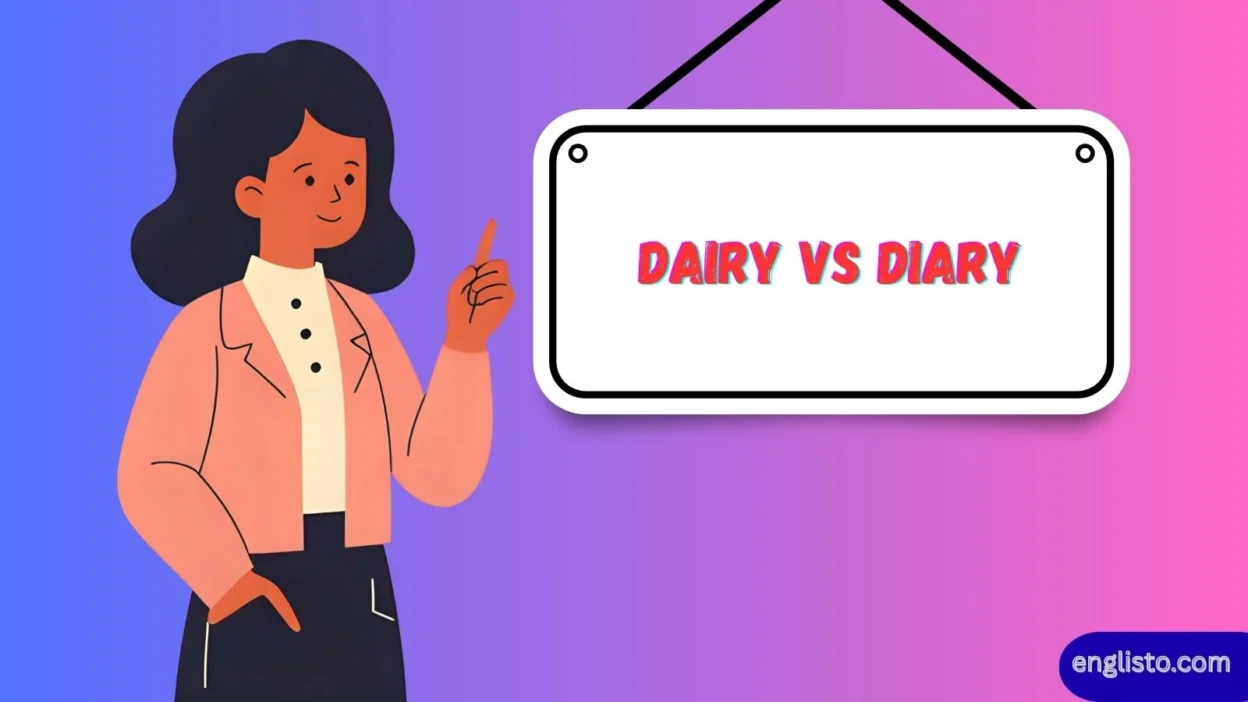Ever typed “Dear Dairy” in your journal and cringed after noticing it too late? You’re not alone! The words “dairy” and “diary” are classic examples of English lookalikes — words that sound almost identical but have completely different meanings. One relates to milk, cheese, and butter, while the other is about personal thoughts, memories, and secrets. Dairy vs Diary.
In this guide, we’ll dive deep into the difference between dairy and diary, how to use them correctly, and fun ways to remember which is which. By the end, you’ll never confuse these two again — even on your sleepiest Monday morning.
What’s the Difference Between “Dairy” and “Diary”?
Let’s start with a quick overview:
| Word | Pronunciation | Part of Speech | Meaning | Example |
| Dairy | /ˈder.i/ | Noun / Adjective | Related to milk and milk products | “I bought fresh milk from the dairy farm.” |
| Diary | /ˈdaɪ.ə.ri/ | Noun | A notebook where you write personal thoughts or daily records | “I wrote about my trip in my diary.” |
Though they differ by only one letter, their meanings couldn’t be more distinct.
Let’s break them down one by one.
Understanding “Dairy” – The World of Milk and More
Meaning and Usage
“Dairy” is a noun or adjective related to milk and products made from milk. Think of anything creamy, cheesy, or buttery — that’s dairy.
- As a noun, it refers to a place where milk is processed or sold.
- Example: “They own a small dairy in the countryside.”
- Example: “They own a small dairy in the countryside.”
- As an adjective, it describes products that come from milk.
- Example: “She’s allergic to dairy products.”
- Example: “She’s allergic to dairy products.”
Common Dairy Products
| Product | Description | Example Sentence |
| Milk | The base of all dairy items | “Pour some milk into your cereal.” |
| Cheese | Made by curdling milk | “He loves cheddar cheese.” |
| Butter | Fat made by churning cream | “Spread butter on your toast.” |
| Yogurt | Fermented milk product | “I eat yogurt for breakfast.” |
| Cream | Thick fatty part of milk | “Add some cream to your coffee.” |
Fun Fact
The word “dairy” comes from the Old English dæġe, meaning “female servant who kneads dough or makes butter.” Over time, it evolved to refer to a place where milk and butter are produced.
Understanding “Diary” – A Window to the Soul
Meaning and Usage
“Diary” is always a noun and refers to a personal record or journal where you write about your thoughts, feelings, or daily activities.
- Example: “I wrote in my diary before going to bed.”
- Example: “Her diary entries reveal her inner struggles.”
It can also refer to a planner or appointment book, especially in British English.
- Example: “Let me check my diary to see if I’m free next week.”
Common Diary Types
| Type | Purpose | Example Entry |
| Personal Diary | Express emotions and reflections | “Today was amazing — I finally got the job!” |
| Travel Diary | Record travel experiences | “Day 3 in Paris: Croissants and the Eiffel Tower.” |
| Food Diary | Track meals or diets | “Skipped breakfast, had salad for lunch.” |
| Dream Diary | Log dreams | “I dreamt I was flying over mountains.” |
| Work Diary | Keep notes about tasks or projects | “Meeting with clients at 10 AM.” |
Cultural Insight
From Anne Frank’s Diary of a Young Girl to Leonardo da Vinci’s sketches and notes, diaries have preserved humanity’s deepest thoughts and ideas for centuries. They’re not just notebooks — they’re time capsules of emotion and experience.
Dairy vs. Diary – The Key Differences
Let’s put them side by side for clarity:
| Feature | Dairy | Diary |
| Meaning | Milk and milk products | A personal journal |
| Pronunciation | /ˈder.i/ | /ˈdaɪ.ə.ri/ |
| Part of Speech | Noun, Adjective | Noun |
| Example | “I avoid dairy because I’m lactose intolerant.” | “I wrote about my day in my diary.” |
| Related Words | Milk, cheese, cream | Journal, notebook, log |
| Field | Food & Agriculture | Writing & Personal Development |
Tip: If it’s something you eat, it’s “dairy.”
If it’s something you write in, it’s “diary.”
Pronunciation: The Subtle Yet Crucial Difference
The confusion mostly comes from pronunciation.
Let’s break it down phonetically:
- Dairy → /ˈder.i/ (like “DAIR-ee”)
Think of “air” — DAIR-y. - Diary → /ˈdaɪ.ə.ri/ (like “DYE-uh-ree”)
It’s a three-syllable word: DYE-uh-ree.
Practice Tip:
Try saying these aloud:
- “I bought cheese from the dairy.”
- “I wrote my feelings in my diary.”
Notice how “dairy” is shorter, while “diary” sounds like it stretches out.
Common Mistakes and Funny Mix-Ups
Because the words look almost identical, people often confuse them in writing. Here are some amusing (and instructive) examples:
| Incorrect Sentence | Corrected Version |
| “I wrote in my dairy last night.” | “I wrote in my diary last night.” |
| “I bought milk from the diary.” | “I bought milk from the dairy.” |
| “She keeps her secrets in a dairy.” | “She keeps her secrets in a diary.” |
Imagine someone saying, “My dairy holds all my deepest secrets.” — That would make the cows blush!
Grammar and Word Family Notes
| Word | Type | Related Forms | Example |
| Dairy | Noun / Adjective | Dairy-free (adj.), Dairyman (n.), Dairymaid (n.) | “I prefer dairy-free milk.” |
| Diary | Noun | Diarist (n.) | “The diarist wrote about her travels.” |
Suffix and Root Clues
- Dairy → Comes from day + -ery, originally meaning a daily milk room.
- Diary → From the Latin diarium, meaning “daily allowance” or “journal.”
So both are related to the concept of daily, but in very different ways — one feeds the body, the other feeds the mind.
Memory Tricks to Remember the Difference
If you constantly mix them up, here are some fun ways to lock the difference into your brain:
- 🧈 Dairy = Milk. Both have “A” before “I.”
- ✍️ Diary = Write. Think of “I” as me — you write about yourself in a diary.
- 🐄 “Dairy” has “air” — cows breathe air.
- 📓 “Diary” has “I” — I write in my diary.
Mnemonic example:
“I write in my diary while sipping dairy milk.”
Real-Life Usage Examples
Let’s see how native speakers naturally use both words:
Examples with “Dairy”:
- “The dairy industry contributes billions to the economy.”
- “She’s trying to cut down on dairy because of lactose intolerance.”
- “They visited a local dairy farm on their school trip.”
Examples with “Diary”:
- “He found his grandmother’s diary from 1945.”
- “I keep a gratitude diary to stay positive.”
- “Her diary entries were turned into a best-selling book.”
Synonyms and Related Words
| Word | Meaning | Synonyms |
| Dairy | Milk-related food | Creamery, farm, milkhouse |
| Diary | Written record | Journal, logbook, notebook, memoir |
Idioms and Expressions
While “dairy” and “diary” don’t have many idioms of their own, they often appear in common phrases:
- “Dairy-free” → Food without milk ingredients.
Example: “I prefer dairy-free desserts.” - “Keep a diary” → Write regularly in a journal.
Example: “Writers are often advised to keep a diary to record ideas.”
Dairy-Free vs. Diary-Free – A Grammar Laugh
Ever seen someone say “I’m diary-free”? Unless they’ve given up writing journals, that’s a typo!
This mix-up happens often on product packaging or menus online — a great reminder to always proofread.
In Pop Culture
- Dairy: In TV commercials, dairy is often associated with wholesomeness — “Got Milk?” campaigns, for example.
- Diary: Movies like The Princess Diaries or Bridget Jones’s Diary highlight personal storytelling and emotional growth.
So while “dairy” nourishes your body, “diary” nourishes your soul.
Practical Writing Tips
If you’re writing for school, blogs, or professional settings:
- Check your vowels. A single misplaced letter changes the entire meaning.
- Use context clues. If you’re talking about food — it’s “dairy.” If you’re writing about thoughts — it’s “diary.”
- Read aloud. Hearing the words helps your brain distinguish pronunciation patterns.
- Use spell-check wisely. It can catch “dairy” vs. “diary,” but not if both are real words used incorrectly in context.
Quick Recap Table
| Aspect | Dairy | Diary |
| Field | Food | Writing |
| Function | Noun/Adjective | Noun |
| Meaning | Milk products | Personal journal |
| Example | “Dairy farm” | “Private diary” |
| Pronunciation | /ˈder.i/ | /ˈdaɪ.ə.ri/ |
| Common Confusion | “Dear dairy…” | “Drank my diary milk…” |
Final Thoughts
Though separated by a single letter, dairy and diary live in entirely different worlds — one in the kitchen, the other in your heart (or maybe your nightstand drawer). Remember this simple truth:
Dairy fills your stomach; a diary fills your soul.
The next time your fingers hover over the keyboard, pause and picture either a cow or a pen — that’ll tell you instantly which one you mean.
So go ahead — enjoy your dairy, and write proudly in your diary. Just don’t mix the two, or your next entry might start with,
“Dear Dairy, today was udderly confusing.”



